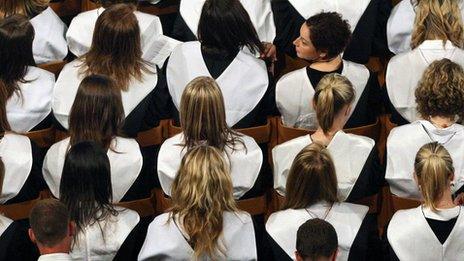Graduates are earning less but more are in work
- Published

More graduates are in work but their typical salaries have gone down, suggest official figures
Graduates in England have seen a fall in their median salary of more than £1,000 in the past five years, according to official statistics, external.
But more are in work than at any time since 2007, suggests Department for Business, Innovation and Skills data.
And graduates still earn almost £10,000 a year more than people without degrees - though the highest earners are those with postgraduate qualifications.
The figures showed a degree was "an excellent option", said the government.
The figures suggest that in the first three months of this year, graduates typically earned £31,200, while non-graduates were paid £22,100, a gap of £9,100.
But in the same period of 2010, graduates typically earned £32,396, some £1,196 more than they do now.
'Improving market'
There was better news for those with postgraduate qualifications, whose median salaries rose from £37,180 to £39,000 during the past five years, as well as for non-graduates, whose median salaries went up from £20,800 to £22,100, according to the figures.
Some 87.5% of working-age graduates were employed during the three months to March - the highest proportion since the end of 2007, when the rate was 88.3%.
This compares with an employment rate of 69.3% for non-graduates.
The figures also suggest an improving employment market for graduates aged between 21 and 30, with only 3.9% unemployed, again the lowest for this time of year since 2007, when it was 3.5%.
"Making the leap from university to the 'real world' of work is becoming easier, and graduate employment has now recovered to 2007 levels," said Andrew Hunter, of recruitment company Adzuna.
"In the last year alone, the unemployment rate among young grads has ticked down 1% year-on-year, with fewer university leavers stuck in limbo between education and work.
"After years of stalemate, with fewer employees moving up or moving out of their positions, the labour market is now much more liquid, which has opened up opportunities for those new to the workforce."
'Lower-skilled'
However, TUC general secretary Frances O'Grady said the overall prospects of young graduates were worsening.
"While university leavers are still better paid and more likely to have a job than non-graduates of the same age, today's figures show their prospects are worsening, just as their debts are soaring," she said.
"Many graduates are now finding themselves doing lower-skilled, lower-paid jobs.
"This is in turn pushing young people who don't have a degree out of work altogether."
A spokeswoman for the Department of Business, Innovation and Skills described the figures as "great news for the UK economy".
"These results demonstrate how higher education is an excellent option for people of all ages seeking to gain employment and a rewarding career," she said.
"Working-age graduates still benefit from a significant earnings premium of, on average, £9,000 per year over non-graduates."
The spokeswoman said higher education was not for everyone, but there were thousands of apprenticeships and courses in further education also leading to "many exciting careers prospects".
Maddalaine Ansell, chief executive of the University Alliance group of business-oriented universities, said the figures showed "degrees continue to be vital for supplying graduates to meet the hi-tech skills needs of the UK's knowledge economy".
- Published12 January 2015

- Published25 September 2014

- Published7 July 2014
.jpg)
- Published12 June 2014
